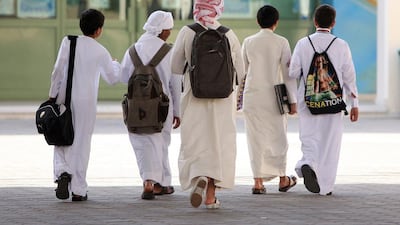Emirati pupils need more help to pass an English-language exam needed for university admissions.
The Federal National Council on Tuesday heard pupils talented in many other subjects found the Emirates Standardised Test (Emsat) difficult.
Emsat is a national system of standardised computer-based tests that pupils in Grade 12 need to take for admissions to UAE's public and private universities.
The exam assesses preparedness for tertiary education and it is also required for scholarship and post-graduate studies.
Universities in the UAE teach in English.
FNC member Adnan Al Hammadi, said the number of Emirati pupils admitted to UAE universities had dropped from 16,000 in 2017 to 12,000 last year, with the poor scores in tests playing a role in this reduction.
He suggested some pupils could prepare for the test while doing National Service.
“There should be more preparation courses, instead of waiting [for them to fail] and then doing support sessions," said Mr Al Hammadi.
“Why not make use of the time they spend in National Service to train them for Emsat?”
The Minister of Education, Hussain Al Hammadi, said pupils had access to online learning platforms while doing their service.
“There are volunteer teachers who assist in tutoring as well," said Mr Al Hammadi. "But we cannot hold classrooms on site [as the member suggested] because they have to undergo a certain training schedule at National Service.”
The FNC member also called for more testing centres across the country to improve access.
But Mr Al Hammadi said there were examination halls at 56 private and public universities and 200 training centres. The minister said seating capacity was reduced because of social-distancing measures adopted during the pandemic.
"They had to limit the capacity by 50 per cent,” he said. "But we have come a long way. Before we were only relying on public universities.”
Concerns about Emsat were also raised by FNC member Sabreen Al Yamahi, who said she knew of a pupil who scored high in several subjects but could not pass the English test.
She said many bright young Emiratis "are sitting at home not able to enrol in university because of this exam".
She said they enjoy high qualifications in many other subjects and should not be deprived of higher education because of the English language.
Mrs Al Yamahi also raised concerns about reduced Islamic and Quran classes at some UAE schools.
She said some had become "summarised" – meaning they had been cut back because of Covid-19 pressures on learning times.
"This could lead our children to extremism as they start to look for information elsewhere and end up learning from non-credible online sources," she said. She said the Quran recitation subject has also been cancelled at public schools.
“Studying the Quran is very important. It strengthens the memory, builds the character, improves fluency and eloquence. I wish that the ministry would focus on this subject.”
The Education Minister said the subject was still being taught through virtual classrooms. "We have 70,000 pupils learning tilawah [Quran recitation] online."
He said that the UAE’s Islamic studies curriculum is balanced and strong and has gained the praise of education officials worldwide.
“We’ve even had requests from other countries, such as Spain, to translate it to their native languages and teach it there,” he said.
But he admitted that the content might have been "summarised" of late because of the pandemic.
Another member, Naama Al Mansouri, suggested Islamic studies could be held more than once a week. “And in some schools they cancelled the sinaa’ [local values] subject,” she said.
She said the subjects were important to the upbringing of young Emiratis.
Mr Al Hammadi said some subjects were limited because of Covid-19 but he said everything would be back to normal once the pandemic was over.


